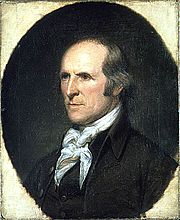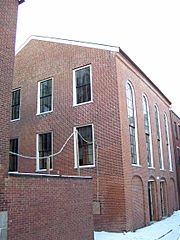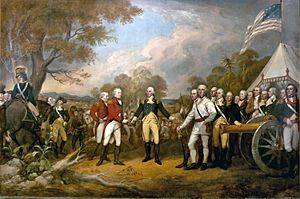Primus Hall facts for kids
Primus Hall (born February 29, 1756 – died March 22, 1842) was born into slavery. His father was Prince Hall, a famous leader who fought to end slavery and served in the American Revolutionary War. Prince Hall also started the Prince Hall Freemasonry.
Primus Hall opened a school for African American children in his home in 1798. Later, the school moved to the African Meeting House. He worked hard to raise money for the school until 1835. Like his father, Primus was a respected leader in the African American community.
He was also known as Primus Trask because he was given to Ezra Trask as a baby. However, in Boston, everyone knew him as the son of Prince Hall.
Contents
Early Life of Primus Hall
Hall was born into slavery on February 29, 1756, in Boston. His parents, Prince Hall and Deliah, were both enslaved at that time. His father, Prince Hall, became a free man in 1770.
As a baby, Primus was sent to live with Ezra Trask, a shoemaker in Essex County. The plan was for Primus to learn shoemaking and become free at age 21. However, due to health issues, he gained his freedom earlier. He was given "full liberty to do any business." Until 1776, he worked as a truck driver and farmer near Salem, Massachusetts.
Primus Hall in the Revolutionary War
Primus Hall was a soldier in the American Revolutionary War. He joined the 5th Massachusetts Regiment when he was 19. His father encouraged both enslaved and free Black people to join the American army. He believed that if Black people helped create the new nation, it would help them gain freedom.
At first, the American army did not accept African American soldiers. But when the British Army offered freedom to Black men who joined them, the American army changed its mind. It is thought that Primus Hall's father might have been one of the "Prince Halls" who served from Massachusetts.
Primus Hall's regiment first went to Winter Hill, Massachusetts. There, they waited during the Siege of Boston. In New York, his regiment fought in the White Plains and Harlem Heights. They also fought in Trenton and Princeton, New Jersey. After one year, Hall joined the army again. He fought in Saratoga, New York, and was there for the Surrender of General Burgoyne.
Working for Timothy Pickering

After the war, Hall met Timothy Pickering. Pickering was a Quartermaster General and a politician. Hall offered to work for Pickering, who hired him as a steward. Pickering wrote to his wife, saying he had found "a likely negro fellow" who was "so intelligent to be capable of learning anything."
Pickering's wife lived in Newburgh, New York, and Pickering was in Philadelphia, Pennsylvania. Hall carried supplies and letters between the two places in the summer of 1781. One writer noted that Hall's choice to work for Pickering was a smart move for his future.
Primus Hall and George Washington
A story tells of Hall helping George Washington exercise during a visit to Pickering's camp. Hall set up a kind of jump rope for Washington. He tied one end to a stake and held the other end at his chest. This story showed Washington playing "with true boyish zest."
Another time, Washington and Pickering finished their work late. Hall offered Washington an extra blanket and straw for a bed. After Washington and Pickering fell asleep, Hall sat on a box to sleep. Washington woke up and realized Hall had given him his own bedding. Washington insisted there was enough for both of them. Hall said the general did not need to worry, but Washington insisted. So, the two men shared the straw and blanket that Hall had given up.
Life in Boston
Family Life
Primus Hall had seven children and was married more than once. After working for Pickering, he started his own business as a soap maker in Boston.
On May 2, 1786, Primus Trask Hall married Phebe Robson. She passed away in 1808 at age 47. In 1810, Primus married Martha Gardner, who died in 1817 at age 36. Primus Hall then married Anna Clark on October 29, 1817.
Hall was an active member of his father's Prince Hall Freemasonry lodge. He also owned property in Boston.
Education Activism

In 1798, Primus Hall started a school in his home for 60 African American children. He sought money from the community, including African American sailors, to support it. Two students from Harvard University later taught at the school.
Hall tried to get the city of Boston to create a public school for Black children in 1800, but he was not successful. So, the school moved to the African Meeting House. This church was built by Thomas Paul, an African American minister. Hall was one of the church's founders. He continued to raise money for the African American school until 1835.
The school helped Black people in Boston get jobs and grow their wealth. This, in turn, helped future generations of Black Bostonians go to college. Hall pushed for better education for African American children, including access to college.
Fighting Against Slavery
Primus Hall was very active in the fight against slavery. Starting in 1788, he signed and sent petitions to the Massachusetts State Legislature about slavery. By the 1830s, he supported William Lloyd Garrison's ideas about ending slavery.
Boston Harbor Fortification
During the War of 1812, Hall helped build defenses at Castle Island in Boston Harbor.
War Pension Benefit
Pension Suit
In the 1830s, Hall applied for a pension as a Revolutionary War soldier. However, the pension office first denied him. They thought that as a Black man, Hall had only been a servant and had not fought in battles.
In his request, Hall described his fighting in New York and New Jersey. He told how he followed two enemy soldiers for half a mile and captured them. After his second time serving, he volunteered for six more weeks at the request of George Washington. After his service in Princeton and Morristown, George Washington signed his honorable discharge papers.
White men who had served with him gave statements saying that Hall had fought like any other soldier. They said he had the respect of officers and other soldiers. Because of this, the pension office's decision was changed. Hall received a pension of $60 per year starting on June 28, 1828. His case was known as Prius Hall, alias Trask.
Widow's Benefits
After Primus Hall passed away, his wife, Ann, applied for benefits as a widow. Her husband was listed as Primus Trask Hall, who served in the Continental Army from Massachusetts.
Death and Obituary
Hall died on March 22, 1842, in Boston. His obituary said he "was well known, particularly to the younger portions of our citizens." It mentioned that he often told stories about the Revolutionary War to young people.


